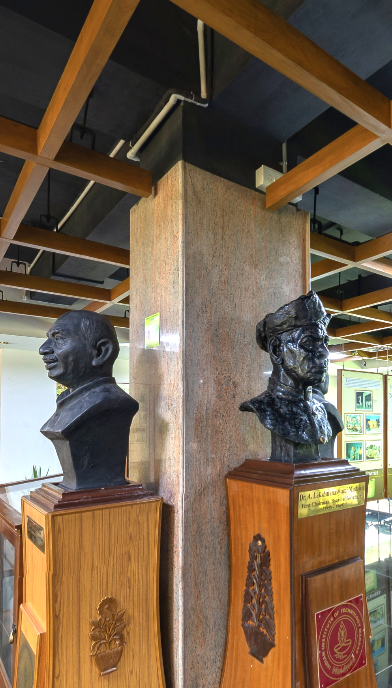Test sand for the measurement of crushing strength of granules
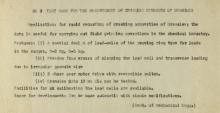
- Photographs , Equipment , 1970s
A sand test is carried out for rapid recording of crushing properties of granules. The data obtained is useful for carrying out fluid grinding operations in the chemical industry. The image describes a sand test that was set up by the Department of Mechanical Engineering for the measurement of crushing strength of granules. The image states that the features of the test were as follows: (a) A special design of load cells (proving ring type cells) in the ranges 0-2 kgs and 0-5 kgs (b) Freedom from errors of clamping the load cell and transverse loading due to irregular granule size (c) 3 phase…
Differential thermal analysis and magnetic balance units
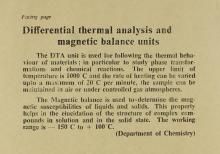
- Photographs , Equipment , 1970s
The image describes differential thermal analysis and magnetic balance units photographed at the department of chemistry. The described units are used for following the thermal behaviour of materials and particularly to study phase transformations and chemical reactions. The upper limit of temperature is 1000° C and the rate of heating can be varied up to a maximum of 20° C per minute. The working range is -150° C to +100° C.
Fluid Energy Mill
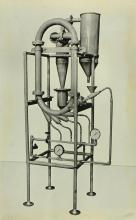
- Photographs , Equipment , 1970s
Seen in the image is a fluid energy mill used by the Department of Chemical Engineering at IIT Madras. A fluid energy mill is a device that is used to obtain micron sized particles of a wide variety of brittle materials. The mill involves no moving parts and causes practically no contamination of the product. This device is highly suitable for heat sensitive explosive or abrasive materials as well as for dyestuff and pharmaceuticals.
Solar Collector-cum-regenerator for air-conditioning
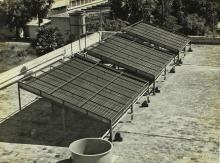
- Photographs , Equipment , 1970s
Seen in the image is a solar collector-cum-regenerator that was built by the Department of Mechanical Engineering, IIT Madras. The panels were possibly set up on top of the Department building. The set-up was used to regenerate the absorbent solution used in solar air-conditioning.
Concrete bed lathe
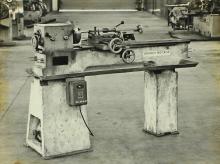
- Photographs , Equipment , 1970s
Seen in the image is a concrete bed lathe used by the Department of Mechanical Engineering at IIT Madras. The lathe has a prestressed reinforced concrete bed and plain reinforced concrete pedestals. The lathe’s gear box uses an extended Ruppert type gear drive that provides nine speeds from 160 to 1000 rpm. The swing over bed is 250 mm and the centre to centre distance is 800 mm. By means of a rack, a manual feed is possible.
Tubular flow reactor with motionless mixing elements
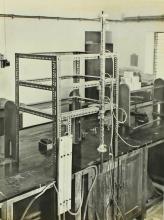
- Photographs , Equipment , 1970s
Seen in the image is a tubular flow reactor with motionless mixing elements that was photographed at the department of chemical engineering. The unit seen in the image can be connected to any process equipment to effect thorough mixing of solids-solids or liquid-liquid. The equipment was found to have superior heat transfer characteristics.
Filament wound tubes under test
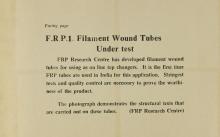
- Photographs , Equipment , 1970s
IIT Madras set up six centres in the year 1973. The Composite Structures (FRP) Research Centre, also known as the Fibre Reinforced Plastics (FRP) Centre, was one of them. The Centre was officially opened in March 1974 and it aimed at co-ordinating and utilising its expertise and resources to advance the special areas of technology that was of national importance. It also aimed at providing technical advice and leadership to the FRP industry in the country. The key objectives of the Centre and services offered included: Research and development of raw materials and composites, process design…
Vibratory conveyor
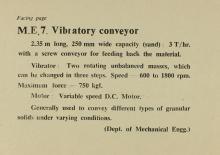
- Photographs , Equipment , 1970s
A vibratory conveyer is generally used to convey different types of granular solids under varying conditions. The image describes the specifications of a vibratory conveyor used by the Department of Mechanical Engineering at IIT Madras. The conveyor is 2.35 m long, 250 mm wide: 3T/her with a screw conveyer for feeding back the material. The speed of the vibrator can be adjusted from 600 to 1800 rpm. The maximum force is 750 kgf. The motor used is a variable speed D.C. motor.
Gobar Gas Complex near Officers’ Hostel

- Photographs , Equipment , 1970s
The individuals in the image are yet to be identified. Seen in the image is a gobar gas complex that was set up near the officers’ hostel. The gobar gas complex was an interdepartmental project forerunner to the technological programme packet at Narayanapuram village adopted by the National Service Scheme of the Institute.
Linear disc motor
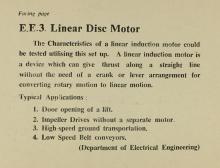
- Photographs , Equipment , 1970s
The image describes a linear disc motor that was made by the Department of Electrical Engineering at IIT Madras. A linear induction motor is a device which can produce thrust along a straight line without the help of a crank or lever arrangement for converting rotary motion to linear motion. The main applications of such a motor can be seen in the doors of lifts, high-speed ground transportation, low speed belt conveyors and impeller drives without a separate motor.
Drug infusion pump
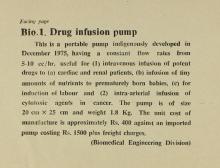
- Photographs , Equipment , 1970s
An infusion pump is a medical device that delivers fluids, such as nutrients and medications, into a patient’s body in controlled amounts. Infusion pumps are in widespread use in clinical settings such as hospitals, nursing homes, and in the home. The image describes the specifications of a portable pump indigenously developed in December 1975 by the Biomedical Engineering Division at IIT Madras. The pump described in the image has a constant flow rate of 5-10 cc/hr and is useful for the following: (a) Intravenous infusion of potent drugs to cardiac and renal patients, infusion of small…
Fluid Energy Mill
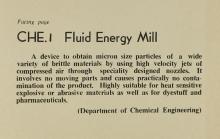
- Photographs , Equipment , 1970s
The image describes a fluid energy mill, and its applications, used by the Department of Chemical Engineering at IIT Madras. A fluid energy mill is a device that is used to obtain micron sized particles of a wide variety of brittle materials. The mill involves no moving parts and causes practically no contamination of the product. This device is highly suitable for heat sensitive explosive or abrasive materials as well as for dyestuff and pharmaceuticals.
Prof. B. V. A. Rao (Applied Mechanics Department) operates a hydraulic vibration machine
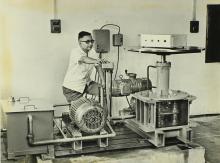
- Photographs , Equipment , 1970s
A hydraulic vibration machine transforms power in the form of high pressure fluid to the reciprocating motion of a table attached to the ram of the actuator. The hydraulic vibration machine described in the image has the following specifications: Maximum load – 1000 kgf, Frequency range – 4 to 25 cps, Amplitude peak to peak – 4 cm and Maximum acceleration – 8 g
Smoke nuisance test on model of ‘State of Bombay’
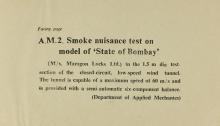
- Photographs , Equipment , 1970s
The ‘State of Bombay’ was a passenger vessel built in 1975 by MAZAGON DOCK (MUMBAI, INDIA). Its gross tonnage was 9500 tons. The current status of the ship is: Decommissioned or lost. The image states that a smoke nuisance test was carried out on a model of the ’State of Bombay’ by the Department of Applied Mechanics at IIT Madras. The test was carried out in a 1.5m diameter test-section of the closed-circuit, low-speed wind tunnel. The tunnel was capable of a maximum speed of 60m/s and was provided with a semi-automatic six-component balance.
Achievements and Aspirations, January 1976
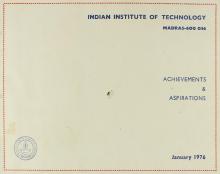
- Photographs , Equipment , 1970s
The cover of the album number 0040 titled ‘Achievements and Aspirations. Apart from the title, the cover has a stamp of the IITM logo and text: ‘INDIAN INSTITUTE OF TECHNOLOGY, MADRAS-600036’ and January 1976.
- Contribute
to the Centre -
Monetary
Support - Digital
Material

